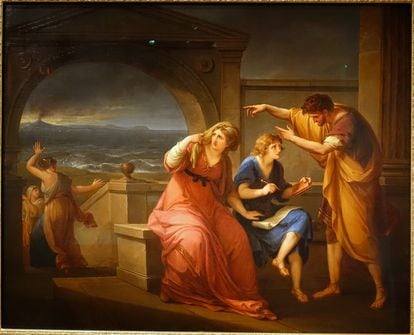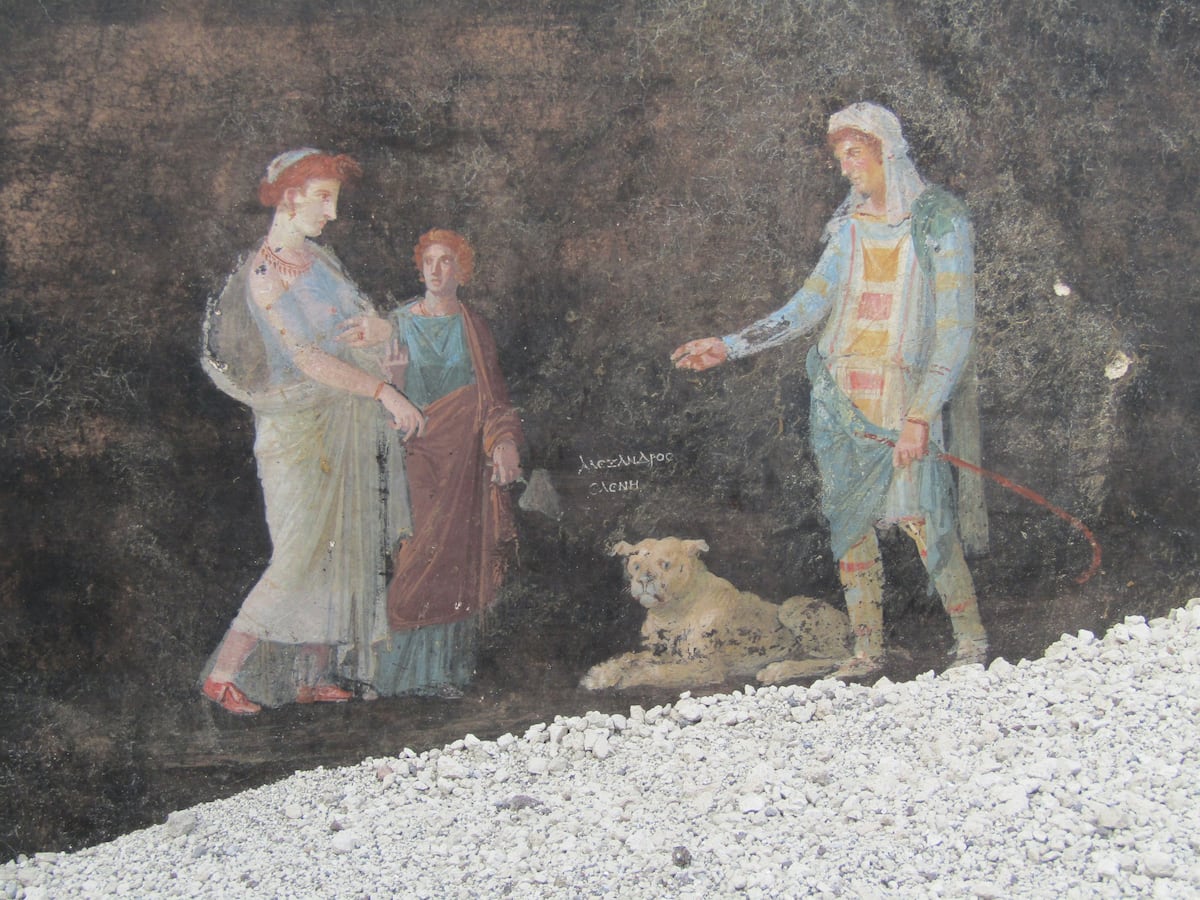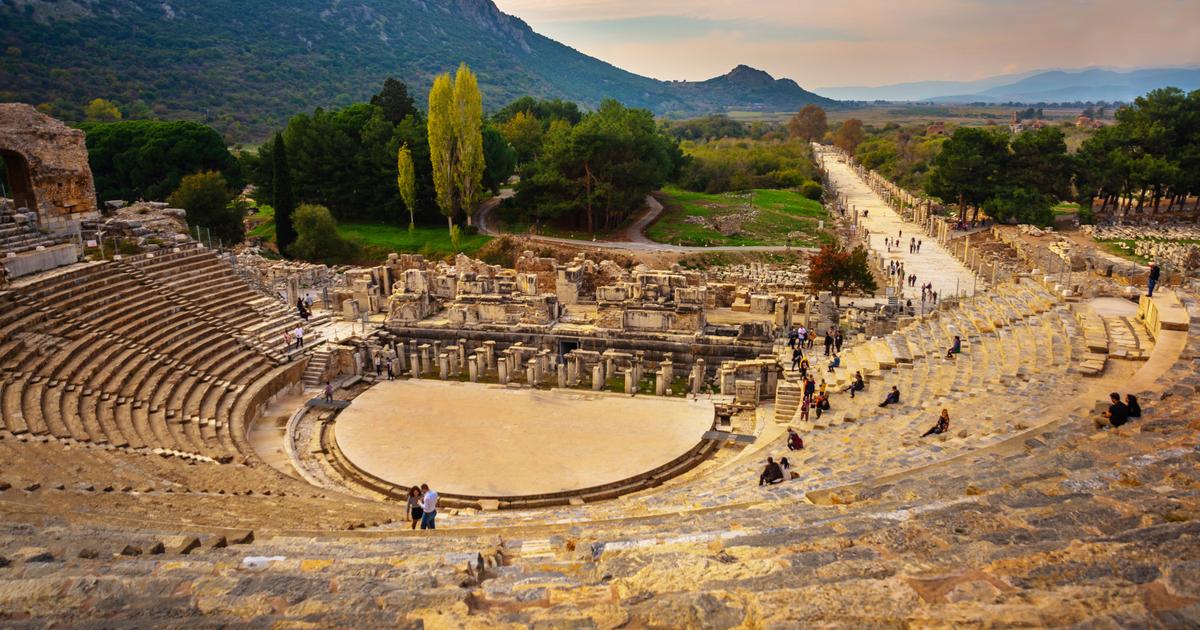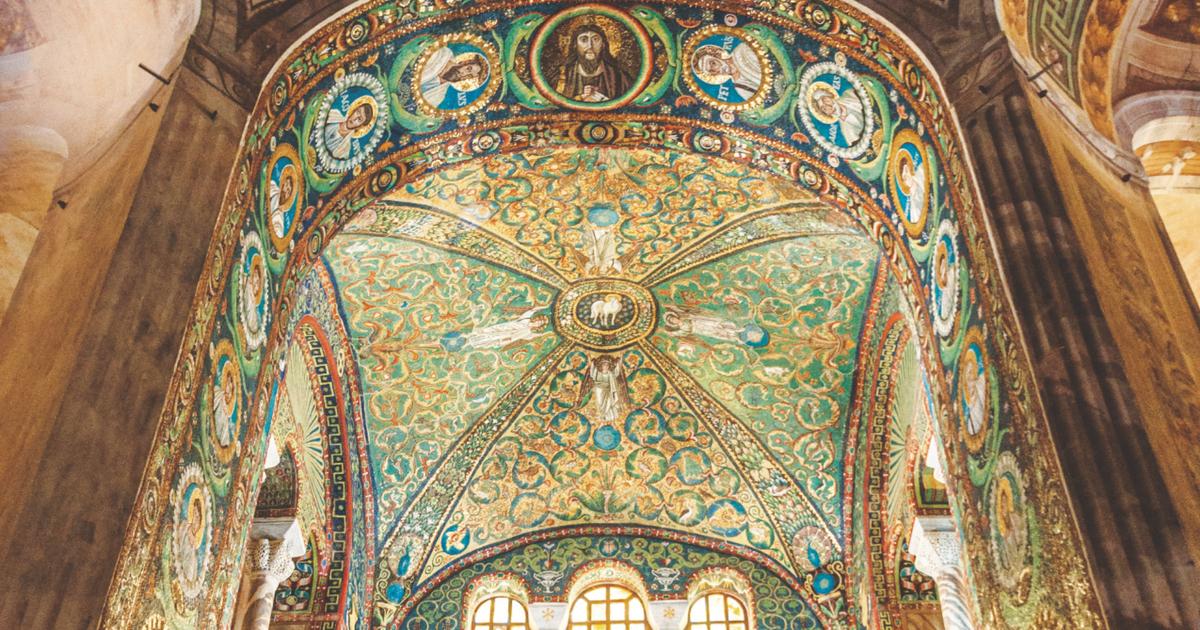The death of Pliny in a painting by Pierre-Henri de Valenciennes.
Great characters from reality and fiction have been under the volcano, from the drunken consul Geofrey Firmin of Malcolm Lowry to Lord William Hamilton, the long-suffering husband of Lady Hamilton, to the volcanologist Haroun Tazieff without forgetting Father Doonan from
The Devil to Four
o'clock and Captain Hanson of
Krakatoa: East Java
. But if it can be said of anyone that the smoking shadow of a volcano (and its pyroclastic consequence) has completely marked his life, it is that of the two Plinios, the Old Man and his nephew the Younger. To explain at the same time his two extraordinary careers —they were two great Romans, both high-ranking officials of the empire and as writers they are part of the core heritage of classical culture— he dedicates an exciting and highly documented book,
Under the shadow of Vesuvius
(Siruela, 2021), the young classicist Daisy Dunn (London, 34 years old), specialist in Catullus, on whom she has published two works.
More information
Pliny skull, slave jaw
Ancient Rome still matters
Gaius Plinius Secundus, Pliny the Elder, born around the year 23 and died in 79, is the most famous victim not only of the eruption of Vesuvius but also of curiosity. Commander of the Roman fleet of the Miseno, Plinio came to the rescue of the population of the area affected by the cataclysm but also, a great amateur naturalist (as well as a historian and admiral), to see the phenomenon up close; so much so that he died on the beach of Stabiae (Estabias), in the Bay of Naples, probably due to the unbreathable atmosphere caused by the volcano, although one source suggests that he had himself killed by a slave. As for his nephew, Gaius Plinius Caecilus Secundus, Pliny the Younger (c. 61-c. 112), is especially known for having been him,that he was in Miseno with his uncle but had the wisdom not to navigate with the relative to the zero zone of the eruption (how important it is not to make bad decisions), who explained for posterity, in two letters, one of them to his great friend the historian Tacitus, the fate of Pliny the Elder and incidentally the spectacle of infernal splendor of Vesuvius vomiting horror. In fact, we owe to Pliny the Younger the description of the 33-kilometer-high cloud in the shape of a mushroom or pine tree that emerged from the volcano and that has characterized the type of eruption, called, therefore, Plinian (not to be confused with cherry pliniana in honor of her uncle).the fate of Pliny the Elder and incidentally the spectacle of the infernal splendor of Vesuvius vomiting fear. In fact, we owe to Pliny the Younger the description of the 33-kilometer-high cloud in the shape of a mushroom or pine tree that emerged from the volcano and that has characterized the type of eruption, called, therefore, Plinian (not to be confused with cherry pliniana in honor of her uncle).the fate of Pliny the Elder and incidentally the spectacle of the infernal splendor of Vesuvius vomiting fear. In fact, we owe to Pliny the Younger the description of the 33-kilometer-high cloud in the shape of a mushroom or pine tree that emerged from the volcano and that has characterized the type of eruption, called, therefore, Plinian (not to be confused with cherry pliniana in honor of her uncle).
In his dual biography, full of sensational details, Dunn alternately explores the lives of the two Plinios, whom he considers to be true advanced Renaissance men, revealing the way of thinking of both in what is a deep immersion in the mentality of Rome. imperial. The book, which uses epigraphic and archaeological sources as well as texts, focuses more on the Young Man, about whom there is more information (he was a senator, corresponded with Trajano, was his representative in the provinces), and is based especially on his letters - that they are actually exquisite pieces of literature — and in the great encyclopedic work of his hyperactive maternal uncle ("Vita vigilia est," he said, to be alive is to be awake),
Natural History.
It is a delicious catch-all, from the moon to the centipede, in which its author tried to compile (in 37 books) all the accumulated knowledge about nature, including that the elephant likes love and glory, that beavers Pontus cut off their genitals themselves if they feel in danger, that the city of Aminclas, in the Tyrrhenian, was destroyed by snakes or that in Rome 8,000 sesterces were paid for a mullet.
Pliny the Elder had written about volcanoes, but not about Vesuvius; if you knew it was a volcano, you probably considered it extinct. The neglect is understandable because it had not given any sign of life for 700 years. He set out with his fleet of quadriremes on a double mission of scientific and humanitarian objective, to organize a Dunkirk in Campania. Given his inquiring nature, he must have enjoyed the experience, at least until he died. "We have a detailed account of his nephew of the courage that Pliny the Elder showed while he died on the beach, probably suffocated by the volcanic cloud," explains Daisy Dunn to this newspaper. “Most of his companions had run to save themselves, so he was alone with two of his slaves. He was a stoic, in awe of the power of nature,so I imagine her last moments were marked by a sense of wonder and acceptance, with just a little fear. Perhaps he thought it appropriate for a man who had spent his entire life studying natural phenomena to lose his life on one. "
Pliny the Younger and his mother at Misenum during the eruption of Mount Vesuvius, by Angelica Kauffman Picasa / Princetown University Art Museum
When asked about the place that the Plinios occupy in Roman literature and culture in general and if her book is an attempt to vindicate them, the scholar responds: “Pliny the Elder is unique as the creator of the oldest encyclopedia of Greco-Roman culture. that is preserved.
Pliny the Younger is more in the tradition of Cicero because he left hundreds of letters and worked in the courts as an orator.
My book is partly a biography of the two men and partly an attempt to tell the story of Rome in the first century of our time.
These two characters together offer us a round portrait of the period.
One sums up what was known or believed then about the natural world;
the other documents the political sphere for us ”.
Paraphrasing
The Life of Brian
What have the Plinios done for us? Dunn doesn't hesitate: “They have shown us the importance of observing the world around us, of looking closely at things. His work has survived so long because it was considered important throughout the ages. Pliny the Elder's writings on natural remedies were highly valued in the Middle Ages. Leonardo da Vinci and others were inspired by his chapters on architecture. And we have Pliny the Younger to thank for our knowledge of what exactly happened when Vesuvius erupted in AD 79 ”. The dependence of the celebrity of both in relation to the volcano is curious; an explosive family, two lives under the volcano. “Exactly, their fame is inextricably linked to Vesuvius. I think his work would have survived regardless of the eruption,but the fact that they lived at that time
explosive
definitely helped cement their names in history. "
It seems easier to feel sympathy for the uncle, an avid reader even during meals, author of the phrase that Montaigne recorded in his castle,
"solum certum nihil ese certi"
("the only certainty is that there is no certainty"), ardent (! ) gardener, who for the somewhat pedantic lawyer nephew.
It would seem that there is greater greatness in the first and the obsession of the Young with posterity - that of which he asked Tacitus to take him out in his
Histories
- It seems somewhat pathetic. And what about persecuting the Christians of Bithynia and reasoning their execution… “It has always been difficult for the children of celebrities to make their own way, just look at the world of today's celebrities. In that sense, I feel sympathy for the nephew and admire his efforts to live beyond his uncle's reputation while perpetuating his uncle's fame. But I think we can say that Pliny the Elder had a more creative mind. And, yes, Pliny the Younger's treatment of Christians is abhorrent and indefensible. It contrasts a lot when we read about it in the last of his ten volumes of letters that are preserved, in which on the other hand he tries to be a just man ”. The nephew became prefect of the treasure of Saturn, augur of the signs of the birds and responsible for the maintenance of the sewers of Rome,in addition to Trajan's legacy for the government of the province of Bithynia-Ponto.
British classicist Daisy DunnAlice Dunn
In any case, the two Plinios were both representatives of the Roman ruling class, who held important military and civil positions — the Old Procurator in Tarraco, by the way — and exercised the power of imperial Rome in their measure; millionaires with vast estates and slaves (the Younger more than 500). “In today's culture we could easily dismiss them as privileged. But by the same token we would be disparaging most of the ancient people of whom we know something. I mean, it would be a mistake. Both Plinios wrote things relevant to all human beings, regardless of their status or wealth, such as how to live without fear or reproach, and how to exist in harmony with the natural world. During the pandemic, in particular, we have really learned our place in nature and our relationship to it.We are all, deep down, the same ”.
On what is his favorite passage in
Natural History
, dedicated by the way to Titus, of whom he was a friend, Dunn notes: “I find the work a fascinating and surprising compendium of facts, gossip and trivia, some exact others not. My favorite is the description of the oysters. Plinio assures that some are small because they are so sad by the darkness of the seabed that they eat less ”. Wow, if you'll excuse me for the
Spartacus
joke and movie quote
, the Plinios oysters or snails? "Certainly, snails", the classicist responds without getting into the rag of the sexual connotations of the phrase with which Crassus (Laurence Olivier) throws the yew trees at Antoninus (Tony Curtis). “Pliny the Younger served them at meals with lettuce, eggs, beets and onions. He disliked it a lot when a friend came to his rather frugal lunches and expected to be served something more luxurious like sea urchins and oysters. " In any case, in the two Plinios there are indications that they could have tasted oysters and snails.
Women, with one notable exception, do not seem to occupy much space in the ideas and lives of both characters. Sign of the times or misogyny? “Sign of the times, sadly. As an author I am always interested in recovering as many ancient women as I can. Pliny the Younger's second wife, Calpurnia [we don't even know the name of the first], fascinates me, not only because of her loyalty, but because of her independence. After suffering an abortion, she traveled to southern Italy without her husband. I find it surprising that a woman felt comfortable traveling to a place that had been devastated by Vesuvius just a few decades before. "
There is a great emphasis in the two Plinios on the relationship between man and nature. Can we consider them advanced in ecology and Nature Writing? “I think they were both way ahead of their time when it came to nature and the natural environment. For example, Pliny the Elder, the David Attenborough of his day, believed that digging too deep for metals could cause earthquakes. We see a similar concern today with
fracking,
hydraulic fracturing, in search of hydrocarbons. Pliny the Elder's belief that if we respect nature she will provide for us is very modern. And yes, the enthusiasm with which he wrote about natural wonders seems like a model for modern
nature writing
”.
In any case, the Old Man must be forgiven for considering Cleopatra a harlot and the octopus a stupid animal.
Daisy Dunn recognizes that despite all her research there are things about the Plinios that remain a mystery.
“I would love to know more about the sentimental life of Pliny the Elder.
Did you ever get married?
Did you prefer men?
Or did you never have sex because they interfered with your work?
In fact, he was a workaholic.
That he made his nephew his heir suggests that he had no family of his own, but we know practically nothing about his personal relationships.
I would also like to know what happened to Plinio the Younger's wine business… ”.











/cloudfront-eu-central-1.images.arcpublishing.com/prisa/S7ERVSCT4FUVX6R7TUVBDNTH5Y.jpg)



